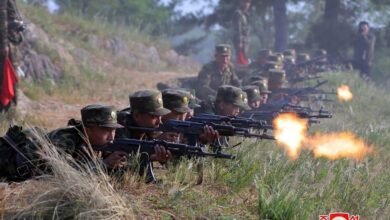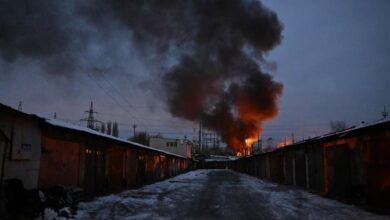Will Egypt Send Troops Into Libya?
While a direct Egyptian intervention would boost Haftar's chances of keeping control of Sirte, Egypt still sees this as a 'last resort,' analysts say.
Egyptian President Abdel Fattah al-Sisi has upped the ante in the chaotic conflict in Libya, warning Cairo could intervene militarily to halt a march eastwards by the Turkey-backed forces of the UN-recognized government.
Sisi’s tough words came after the Tripoli-based Government of National Accord (GNA) pushed back the forces of eastern strongman Khalifa Haftar defeating his 14-month bid to capture the Libyan capital.
On Saturday, the Egyptian general-turned-president warned that if pro-GNA forces advanced on the strategic city of Sirte — some 450 kilometers (280 miles) east of Tripoli — it could provoke “direct” intervention by Cairo.
What Did Egypt Say?
Sisi said attacking Sirte or the Al-Jufra airbase would be tantamount to crossing a “red line” and cited defending Egypt’s western border as grounds for “direct intervention.”
The stalemated offensive on Tripoli by Sisi’s ally Haftar crumbled after Turkey threw its military weight behind the GNA.

With Ankara’s support, the GNA has scored a series of military victories and vowed to move further to retake the coastal city of Sirte, a gateway to Libya’s key oil export ports.
Sisi’s declaration was backed by the speaker of Libya’s eastern-based parliament Aguila Saleh, and allies in the region including Saudi Arabia, the United Arab Emirates, Bahrain, and Jordan.
But it drew the ire of the GNA, which denounced it as a “declaration of war.”
Will Egypt Go to War in Libya?
Analysts have dismissed the possibility of an all-out war between Egyptian and Turkish forces in Libya.
“It is highly unlikely that Egypt will enter a direct war in Libya,” said Hassan Nafaa, political science professor at Cairo University. Sisi’s message was “more a political one than a military one: ‘That Egypt stands by its allies,'” he said.
Neither Egypt nor its Arab allies have “the illusion that they are going to roll back the GNA into Tripoli. It’s more just defensive,” agreed Claudia Gazzini of Brussels-based think tank the International Crisis Group.
Sisi’s tough stand was a warning “to alert the Americans mainly” that the latest push by Turkey constituted a threat, she added.
What Are the Stakes for Egypt?
Egypt’s long and porous desert border with Libya has been a major concern for Cairo, especially since the 2011 overthrow of longtime dictator Moamer Kadhafi triggered chaos in its neighbor.
Egyptian leaders have blamed major attacks within its borders on militants sneaking across the Libyan border.
Cairo “distrusts the Government of National Accord and sees Turkey’s involvement as a serious threat,” said Yezid Sayigh, senior fellow at Carnegie Endowment. Its backing for Haftar primarily “derives from the hope that he can deliver a secure and stable common border,” he added.
Earlier this month, Egypt proposed a peace initiative for Libya, which it dubbed the “Cairo Declaration,” calling for a ceasefire, the disbanding of militias and the withdrawal of mercenaries.
But the plan, unveiled by Sisi with Haftar at his side, was dismissed by the GNA and Ankara as an attempt to buy time for the strongman’s forces to regroup.
Why Does Egypt Worry About Turkey?
Relations between Cairo and Ankara have deteriorated dramatically since Sisi led the army’s 2013 ouster of his predecessor Islamist president Mohamed Morsi, who was supported by Turkey.
Now that they stand on opposing sides of the Libyan conflict, Egypt fears that militias allied with Turkey could penetrate its borders.

“The biggest fear there is that if the GNA advances, it means Turkey advances and this means that Egypt’s foe becomes a neighbor,” said Gazzini. “This is a scenario they would like to avoid.”
For that to happen, Egypt may intervene to at least ensure that Haftar’s forces stand their ground in Sirte and Jufra, according to Nafaa.
“Direct intervention would help them considerably by securing their rear, freeing up troops to redeploy to central Libya, and strengthening morale,” said Sayigh.
What’s Next?
While a direct Egyptian intervention would boost Haftar’s chances of keeping control of Sirte, Egypt still sees this as a “last resort,” analysts say.
“The possibility that Egypt will intervene directly is increasing, although I think the Sisi administration strongly prefers not to, and will only do so as a last resort,” said Sayigh.
Egypt boasts one of the Middle East’s largest militaries with between 438,000 and 458,000 active personnel, according to the US CIA.
It is among the top recipients of US military aid, receiving nearly $1.3 billion. This is part of Washington’s policy to help Cairo combat jihadists in the Sinai. In May, the US also approved a $2.3 billion deal for the purchase of attack helicopters for Egypt.
Sisi has not elaborated on his plans for any intervention, but has urged Egyptian troops to “be prepared to carry out any mission, inside our borders, or if necessary, outside our borders.”
He also told Libyan tribes that Egypt was ready to support, arm, and train their young.
Any Egyptian military intervention would come at a heavy financial cost for the country’s economy which had been showing some signs of recovery following years of political turmoil.
“It is a high-risk initiative if Egypt were to embark on this,” said Gazzini.
It could, however, result in a “strategic stalemate which hopefully could lead to a more serious diplomatic effort by the international community to produce a lasting political settlement of the Libyan conflict,” said Sayigh.












